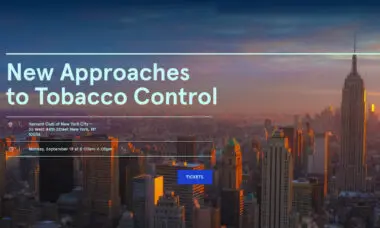 US scientists need to communicate more effectively with politicians and the public to ensure the country overcomes a long-held prohibitionist mindset when it comes to tobacco harm reduction, according to some public health experts.
US scientists need to communicate more effectively with politicians and the public to ensure the country overcomes a long-held prohibitionist mindset when it comes to tobacco harm reduction, according to some public health experts.
Ray Niaura, professor of public health at New York University, told ECigIntelligence he remains optimistic that some good common sense will prevail, but added: “When the process becomes highly politicised, it is complicated to break through.”
Niaura, who will be among the featured speakers at the healthcare policy conference New Approaches to Tobacco Control in New York next week, added: “One thing that I am optimistic about is that if you look at the current administration, they have embraced drug harm reduction in a much more substantial way than any prior federal government has done.
“People have to realise that the evidence supporting a prohibitionist view is diminishing, but that’s a hard message to get across. I think there needs to be a political constituency with a stronger voice.”
He said there was a “quiet revolution” under way across the country toward new, emerging products. Nevertheless, he said, politicians need to figure out that while adult smokers can benefit from alternatives to smoking, young people can also be protected.
“There are ways to control sales and access, especially now with new ways to verify identification. But on the other side, if young users can be protected, it’s much easier to say that adult smokers have potential benefits. And so the trick is getting the balance between those two things,” Niaura said.
Jasjit Ahluwalia, physician and public health scientist at Brown University’s Schools of Public Health and Medicine, said the academic and public health community had developed an intense distrust towards the industry – and that this suspicious view was mirrored in the media. He said this was due to a long history of doubt and anger toward the tobacco industry, which had lied to the American public and Congress for many years and misled the public with modified or unshared research findings.
‘Everyone practises harm reduction’
“Every human being on this earth practises harm reduction, to some extent or the other,” Ahluwalia said. “It doesn’t matter what’s the disease stated, we’re all practising harm reduction, but we won’t allow it for tobacco.”
He added that things were changing, and smoking prevalence had decreased dramatically. “I remain an optimist,” he said. “I think one way or the other, a couple of things are happening. The consumption of cigarettes is going down. And I think that’s due to cultural and social-cultural changes, but also since these other products are available and people are reducing harm.”
Commenting on recent developments at the US Food and Drug Administration (FDA, Niaura said the agency had been disorganised and too strict in reviewing reduced-risk products. However, he said, at least the FDA came to a decision – and that the agency is supposed to be protected from political influence, even if in practice it isn’t. “I think another strategy is to convince the politicians that they should trust the FDA to do its job properly,” he added.
Ahluwalia believes that a number of premarket tobacco product applications (PMTAs) will succeed, allowing alternative products to remain on the market legally.
“E-cigarettes will continue to be available in this country and will be accepted more,” he said. “Right now, the problem is that more than half the American public thinks e-cigarettes are as or more dangerous than cigarettes, which is a ludicrous concept.
“It’s hard to know when we will come to accept nicotine as a drug – we will see how that unfolds over the next five to ten years.”
- Drs Ray Niaura and Jasjit Ahluwalia will be featured speakers at the healthcare policy conference New Approaches to Tobacco Control in New York on 19th September.
– Antonia Di Lorenzo ECigIntelligence staff







